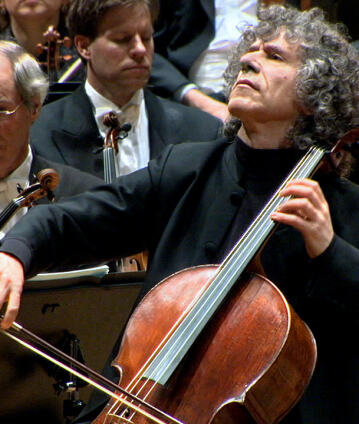Dvořák’s Cello Concerto with Steven Isserlis and Alan Gilbert

Of the few important cello concertos in the repertoire, Antonín Dvořák’s contribution to the genre stands out because of its inexhaustible melodic richness and mellow late Romantic tone. Steven Isserlis – “Britain’s greatest cellist” (The Telegraph) – performs the concerto with Alan Gilbert, who also conducts Bohuslav Martinů’s Fourth Symphony from 1945: a work filled with immense relief at the end of the Second World War.
In this concert, Alan Gilbert conducted Czech compositions with the Berliner Philharmoniker which were composed in his native city of New York: Antonín Dvořák’s Cello Concerto and Bohuslav Martinů’s Fourth Symphony. The two composers took up residence in their temporary home in the United States for very different reasons, however. Whereas Dvořák accepted a well-paid position in the up-and-coming musical metropolis of New York in 1892, at the height of his international fame, Martinů left Paris and crossed the Atlantic, fleeing the invading National Socialists.
Martinů began work on his Fourth Symphony in 1945, during the last months of the Second World War, and completed it a few weeks after the unconditional surrender of the Nazi regime. In Alan Gilbert’s opinion, the work should be understood as a musical reflection of this event in world history. The second movement depicts the horror of war, and the finale, relief in view of the hoped-for peace. The electrifying work by the still-underrated composer exhibits structural features of the Baroque concerto grosso as well as ingeniously used elements of French Impressionism.
Dvořák’s contribution to the genre stands out from the not very extensive group of major cello concertos due to its unique inventiveness in the late Romantic tone. The concerto was composed as the last work in a tremendously productive American creative phase, although the premiere did not take place until 1896 in London, after the composer had returned to Europe. During the subsequent years Dvořák again devoted himself increasingly to opera and, emulating Franz Liszt, also composed a series of symphonic poems. The Philharmoniker and Alan Gilbert opened the concert with one of these works, The Noon Witch, which is based on a gruesome fairy tale.
© 2009 Berlin Phil Media GmbH
Related interviews
Artists
Our recommendations
- Benefit concert “Together for humanity”
- The Junge Deutsche Philharmonie with David Afkham and Steven Isserlis
- Alan Gilbert and Joshua Bell
- Honegger’s “Jeanne d’Arc au bûcher” with Alan Gilbert and Marion Cotillard
- Alan Gilbert and Thomas Zehetmair
- Alan Gilbert, Daniel Müller-Schott and Magnus Lindberg